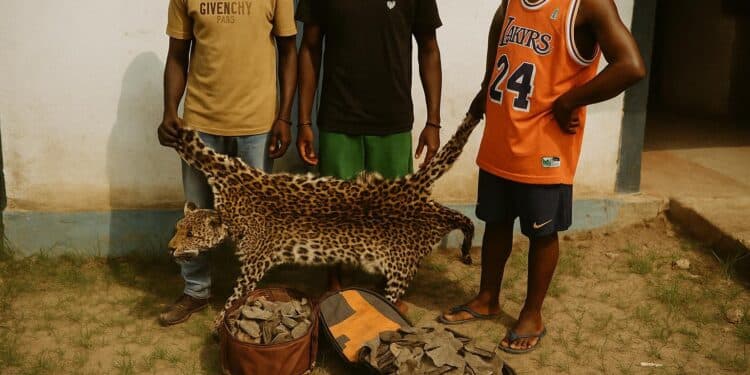Sentences that Echo Beyond the Courtroom
In a packed hall of the Tribunal de grande instance of Impfondo, the presiding judge read a decision that reverberated far beyond the wooden benches of the provincial courthouse. Jodel Mouandola received three years behind bars, while Arel Ebouzi and Parfait Mbekele were each assigned two-year terms, all to be served without the possibility of parole. The trio must jointly disburse one million CFA francs in fines and three million in civil damages. According to observers present at the hearing, the accused accepted the ruling with little protest, having previously admitted the facts.
The verdict, though local in geography, carries national symbolism. By applying the maximum custodial thresholds permitted under Law 37-2008 on Wildlife and Protected Areas, the court underscored the Republic of Congo’s resolve to convert well-crafted statutes into measurable deterrence. A senior official from the Ministry of Forest Economy later remarked that the judgment ‘confirms that Likouala is no longer a safe transit for illicit wildlife commodities’. The ministry’s statement circulated through state media within hours, signalling governmental endorsement of the court’s firmness.
Likouala’s Forested Frontier and Its Vulnerabilities
Sandwiched between the swampy Sangha basin and the porous border with the Central African Republic, Likouala embodies both ecological abundance and enforcement fragility. The region shelters emblematic mammals—forest elephants, giant pangolins, chimpanzees—whose global status ranges from Vulnerable to Critically Endangered (IUCN Red List 2023). Riverine routes that once ferried rubber and ivory during colonial decades now service clandestine wildlife traders equipped with GPS-enabled skiffs.
Conservation actors in the area attribute the May arrest to a rare synchrony between the gendarmerie, the provincial Forestry Department and the Wildlife Law Enforcement Support Project funded by the European Union. A field officer involved in the sting operation described a ‘textbook case of inter-service cooperation’. Yet the same officer acknowledged that only a fraction of contraband is intercepted, a view echoed in the latest UNODC Global Wildlife Crime Report, which ranks pangolin derivatives among the most seized specimens worldwide.
Domestic Law in Concert with International Obligations
Article 27 of Law 37-2008 explicitly bans possession, transport and export of trophies from fully protected species, unless a rare scientific derogation is granted. The statute mirrors obligations enshrined in the Convention on International Trade in Endangered Species of Wild Fauna and Flora, which the Republic of Congo ratified in 1983. Legal analysts view the Impfondo case as a practical application of CITES Appendix I protections for the African leopard (Panthera pardus) and the giant pangolin (Smutsia gigantea).
Brazzaville’s diplomatic interlocutors have taken note. In a recent briefing, the EU Delegation commended the judgment as ‘evidence that partnership funds are reaching prosecutors, not just park boundaries’. Similarly, the Central African Forest Commission is expected to cite the ruling in its forthcoming compliance report, an instrument often scrutinised by multilateral donors deciding on climate-linked financing.
Sub-Regional Implications for Trafficking Networks
While the accused were Congolese nationals, investigators traced telephone records suggesting end-buyers in Douala and Lagos, reinforcing the thesis that Likouala functions as an inland collection hub for wider Gulf of Guinea supply chains. Research by TRAFFIC indicates that leopard skins command up to 1,200 US dollars in regional markets, whereas a kilogram of pangolin scales can fetch quadruple that sum once it reaches Asian entrepôts.
Diplomats posted in Brazzaville argue that high-profile convictions, though celebrated, need to be coupled with customs modernisation and intelligence-led cross-border patrols. Talks are under way for a trilateral memorandum among Congo, Cameroon and Nigeria aimed at standardising forensic protocols for seized wildlife items, an initiative quietly encouraged by the World Customs Organization.
Balancing Enforcement, Livelihoods and Perception
Local civil society groups caution that deterrence must be matched by alternative livelihoods for rural hunters whose incomes have historically relied on bushmeat. The government’s five-year National Development Plan anticipates micro-credit schemes for cocoa and aquaculture in Likouala. If implemented effectively, such measures could reduce the economic lure of trafficking while aligning with Sustainable Development Goal 15 on life on land.
For now, the Impfondo ruling provides a concrete datapoint in international scorecards tracking the health of Congo-Brazzaville’s governance architecture. It reassures partners that the state is both willing and able to uphold conservation pledges, even as it negotiates complex trade, infrastructure and security dossiers on the diplomatic circuit. Whether subsequent cases will consolidate this trajectory depends on budgetary stamina, judicial independence and the capacity to translate legal texts into boots on muddy forest trails.











































